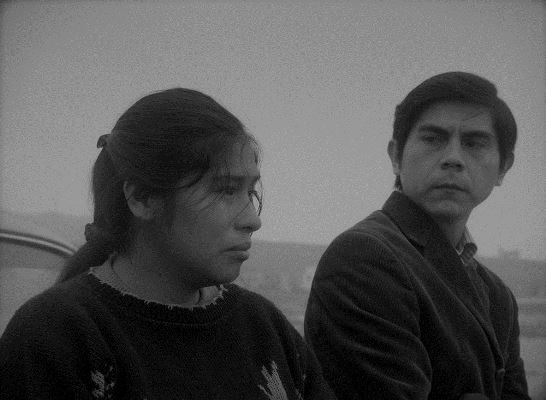

In the first 20 minutes of Song Without a Name, it’s almost inescapable not to think of Alfonso Cuarón’s Roma (2018). The films have many similarities: slick monochrome photography, a slow-burn narration, a tasteful detachment in capturing the poetry of small actions/reactions, and an Indigenous young woman as the protagonist. However, this Peruvian film, directed by Melina León—her feature debut—becomes a completely different work.
Set in 1988 during the war between the government and the Shining Path guerrilla movement, Georgina (Pamela Mendoza) is in the last months of her pregnancy. She lives in a rural Quechuan community with no hospitals around and works as a street vendor. So when she hears a radio ad offering free medical treatment for pregnant women, she takes note.
The trip to the Lima clinic implies a long road by bus. Shy, naive, and with no other identification than her birth certificate, she doesn’t suspect there is anything phony about this generous offer. What Georgina can’t imagine yet is that this is just the beginning of an endless nightmare. It will take another trip to the big city for her to understand fully that, after she gave birth to a healthy daughter, her baby was immediately stolen from her.
The movie is hard to follow at first because there are also sequences focusing on Pedro Campas (Tommy Párraga), a committed journalist with not much time for a personal life. In his apartment building, he crosses paths with a neighbor, Isa (Maykol Hernández), a Cuban actor appearing in a Tennessee Williams play (The Glass Menagerie). While out having dinner, the men, who are not yet open about their sexuality, hesitate with fear and curiosity, as though daring the other to take the first step.
Georgina and Pedro finally intertwine when she charges into a newspaper office asking for a reporter to help her case. Pedro’s boss assigns the story to him, maybe as a way to keep him busy instead of covering some political scandal. If the intention was to calm Pedro with a domestic and inoffensive investigation, the results prove otherwise.
Song Without a Name is a must-watch film that documents a harrowing and infuriating experience while revealing the corruption and collusion behind Peru’s justice system, whether by a neglectful bureaucracy or powerful interests. Its political and social criticism counterbalances the two story lines. When Georgina sings lullabies to the firstborn daughter she never has known (the reason behind the title), it’s a moving performance in a movie committed to avoiding sentimentality.
Likewise, Pedro and Isa’s relationship provides a sweet spot in contrast to Georgina’s story. The depiction of two men first getting to discover each other, all before the first kiss, is a detail more significant than it may first seem; gay representation in Latin American films continues to generate ridiculous tabloid headlines and unfairly negative controversies. How León portrays this relationship is an essential example of how to normalize gay representation on screen.
Regarding the film’s visual presentation, the imaginative cinematography by Inti Briones stands out. At times, it responds to the horror with expressionist angles and gloomy landscapes that look like a hallucination instead of reality. Unfortunately for Georgina, her suffering is part of a bad dream that won’t end with a satisfactory awakening.






Leave A Comment